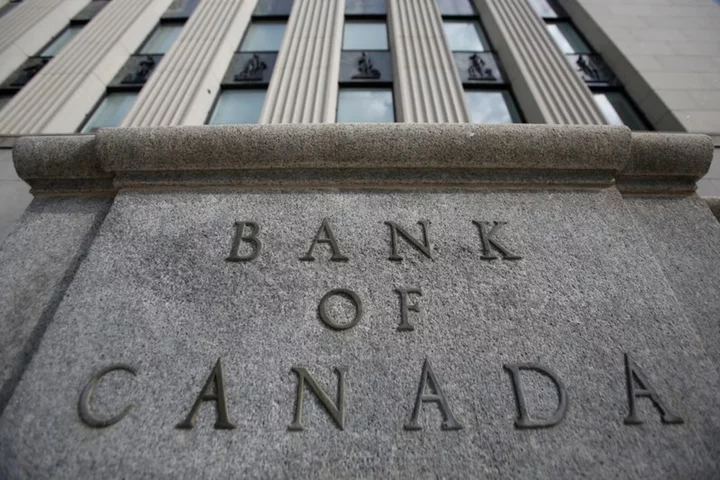By David Ljunggren and Nivedita Balu
OTTAWA (Reuters) -Canada's central bank on Wednesday highlighted stress building in customers with auto loans, while saying mortgage owners largely coped from a record pace in interest rate increases which has squeezed household budgets.
In its quarterly Monetary Policy Report released on Wednesday, the Bank of Canada said indicators of financial stress point mainly to non-mortgage holders, without giving details.
"Although delinquency rates for mortgage products have remained close to their all-time lows, the share of borrowers falling behind on payments by 60 days or more has continued to increase for most credit products," it said.
"In particular, delinquency rates for motor vehicle loans have surpassed pre-pandemic levels."
The central bank hiked rates 10 times from March 2022 to July 2023, leaving them at a 22-year high of 5.0%. The bank said tighter lending conditions had helped cut demand for housing.
Canada's top five banks together had roughly C$377.5 billion ($273.8 billion) in outstanding personal loans at the end of July 31, which generally includes vehicles, boats and motorcycles. Impaired loans in this category are roughly about 0.3%.
Overall, the top five banks had nearly C$1 trillion in consumer loans, which also includes credit cards.
The big banks have set aside more funds in anticipation of loan defaults in a challenging environment as consumers struggle to make their payments amid rate hikes.
While mortgage takes up a big chunk of monthly expenses, consumers also had an average balance of C$26,987 in auto loans, up 5.67% from the prior quarter, according to Transunion data. Auto-loan minimum payments were up by 5% year-over-year, reaching C$640, the report said.
Bank of Montreal has said it would wind down its indirect auto finance business and focus on other areas and is now reportedly exploring the sale of its recreational vehicle loan portfolio.
The central bank said higher rates meant the pace of growth had decelerated for 85% of categories of consumer spending, with the notable exception of motor vehicle purchases.
The pandemic and consequent shortages of semiconductors meant people had been unable to buy autos, it noted, adding that "the recent increase in purchases likely reflects improved supply combined with pent-up demand".
($1 = 1.3789 Canadian dollars)
(Reporting by David Ljunggren in Ottawa and Nivedita Balu in Toronto; Editing by Steve Scherer and Emelia Sithole-Matarise)

